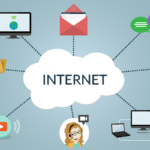Social media has transformed the way people interact, connect, and communicate with one another in modern society. Over the past two decades, it has become an integral part of daily life, influencing individuals, businesses, and entire industries. Social media platforms like Facebook, Instagram, Twitter, LinkedIn, TikTok, and others have bridged geographical divides, allowing people to communicate instantly regardless of their location. While the invention of telephones, emails, and text messaging previously shaped human communication, the rise of social media represents a significant turning point in history, enabling real-time, multi-faceted communication on an unprecedented scale. Its far-reaching impact is evident in how it influences interpersonal relationships, businesses, politics, education, and even personal identities.

One of the most significant impacts of social media on modern communication is its ability to connect people instantly, breaking down traditional barriers of distance and time. Friends, family, and colleagues who are separated by thousands of miles can share messages, photos, videos, and experiences within seconds. Platforms like WhatsApp and Messenger provide cost-effective and efficient communication methods that outperform traditional communication tools. Features like group chats and video calling enable people to interact in real time, fostering a sense of closeness even in virtual environments. This has played an invaluable role in keeping families and friends connected, especially during times of crisis or global events such as the COVID-19 pandemic, when physical meetings were restricted.
Moreover, social media has given individuals an unprecedented ability to share their thoughts, ideas, and experiences with wide-reaching audiences. Platforms such as Twitter and Facebook have empowered ordinary people to express opinions, offer social commentary, and highlight important issues. Real-time updates and trending hashtags allow people to engage in meaningful conversations about politics, global news, or social activism. Social media has played a key role in driving important societal changes, as evidenced by movements like the Arab Spring, Black Lives Matter, and climate activism campaigns. People can spread awareness about causes, share resources, and mobilize communities quickly and effectively in ways that were not possible through traditional media channels.
However, the influence of social media on modern communication extends beyond personal relationships to impact businesses and marketing practices. Companies now rely on platforms like Instagram, YouTube, LinkedIn, and Twitter to reach global audiences, advertise products, and engage with consumers directly. The interactive nature of social media allows businesses to collect customer feedback, resolve complaints, and build long-term relationships with their audience. Social media marketing, influencer endorsements, and viral campaigns have revolutionized advertising strategies, with businesses leveraging user-generated content to build credibility and create personalized customer experiences. Small businesses, in particular, benefit from cost-effective marketing tools that give them access to larger audiences without the need for huge advertising budgets.
The role of social media in shaping political discourse and activism cannot be overlooked. Politicians and government bodies frequently utilize social media platforms to communicate with citizens, announce policies, or shape public perception. Social media’s direct reach enables political leaders to bypass traditional news media and speak directly to audiences through platforms like Twitter and Facebook. While this has helped increase public awareness and citizen engagement, it has also sparked concerns about misinformation and the spread of fake news. False or manipulated information often goes viral on social media, contributing to misunderstandings, divisive debates, and social polarization. Therefore, the role of fact-checking and responsible platform regulation has become increasingly critical in preserving trust and truth within public communication.
In addition to its influence on politics and business, social media has redefined the way people access education and share knowledge. Platforms like YouTube, LinkedIn Learning, and Facebook Groups have opened doors for self-paced learning, virtual mentorship, and peer discussions. Students can now collaborate on group projects, connect with teachers, and attend virtual classrooms through social media tools. Educational content is easily accessible, empowering people across different age groups to learn new skills and acquire knowledge without geographical or financial barriers

